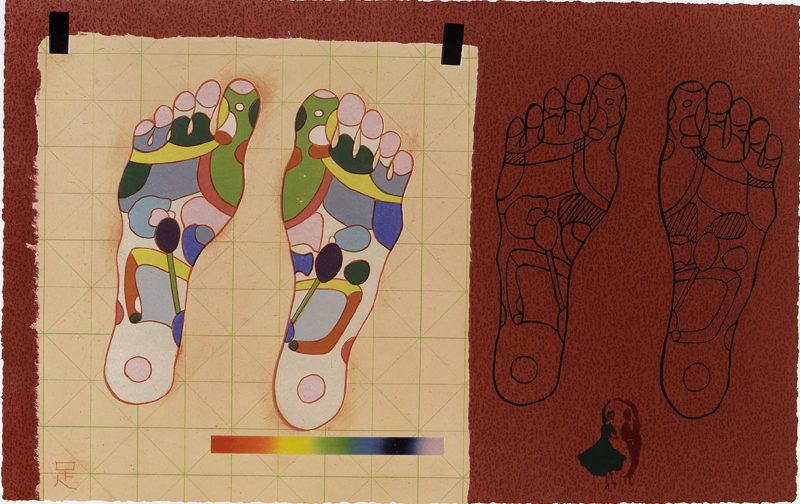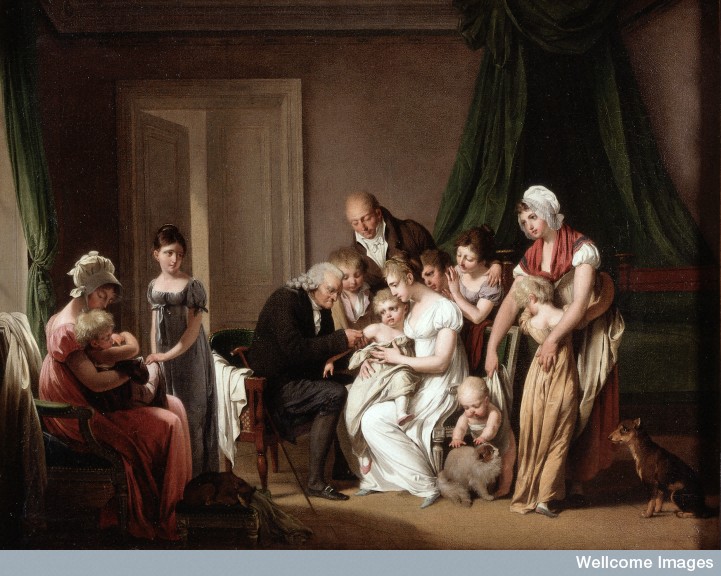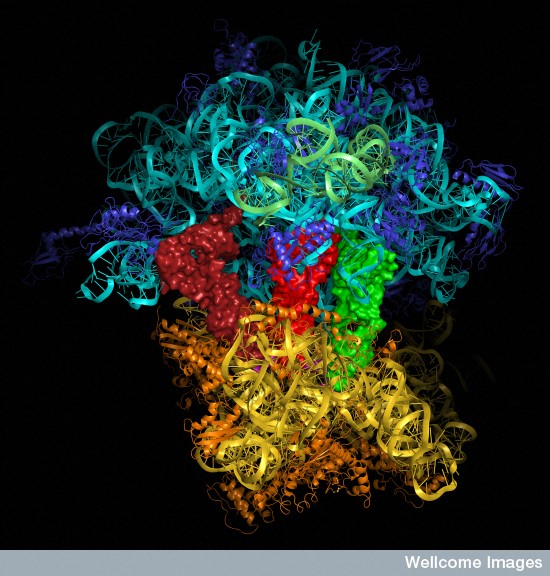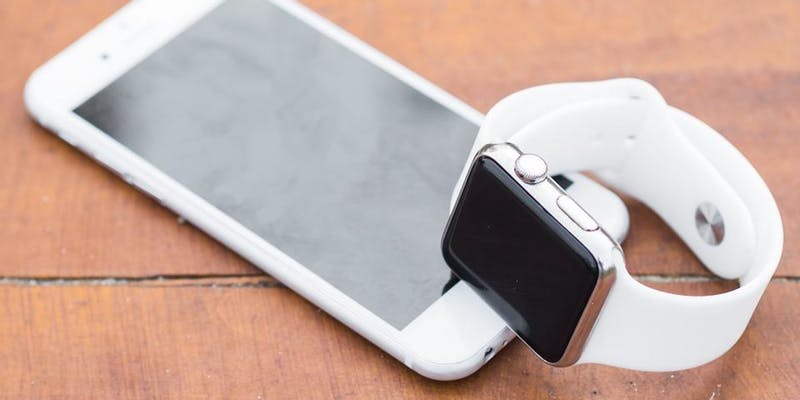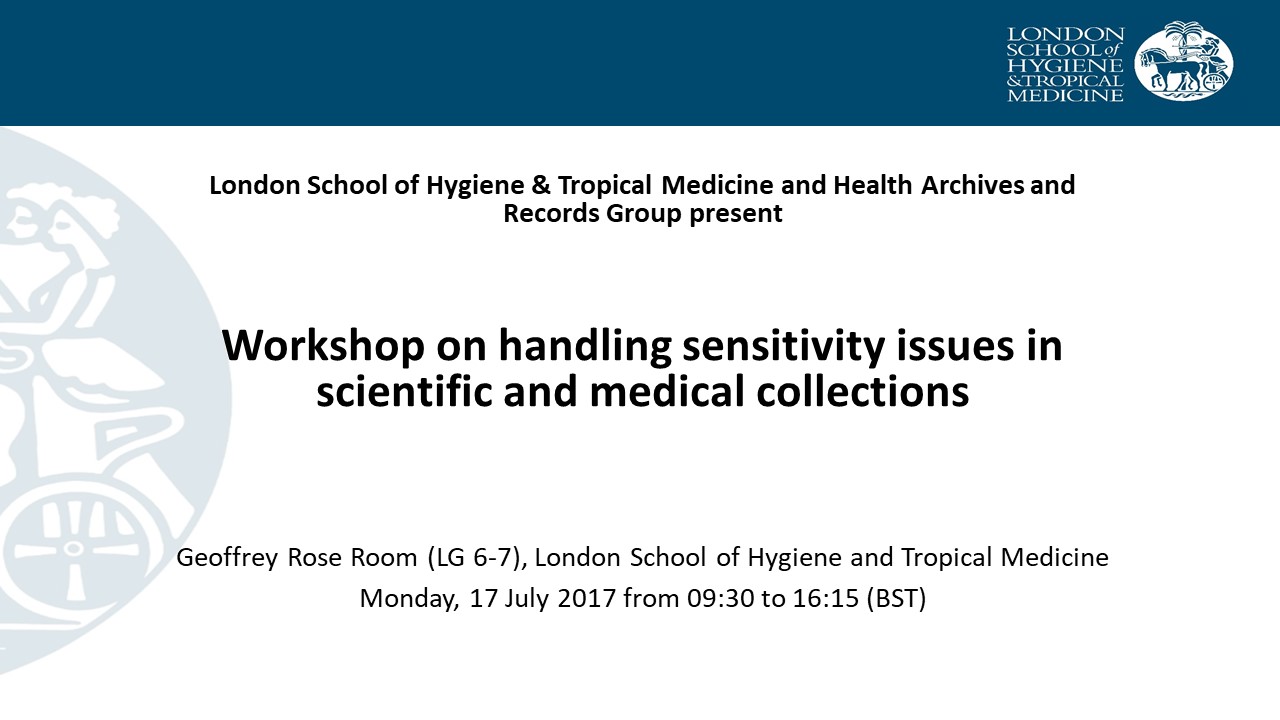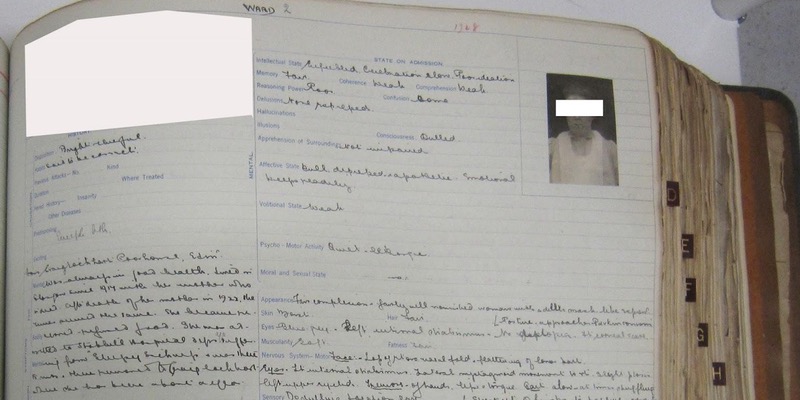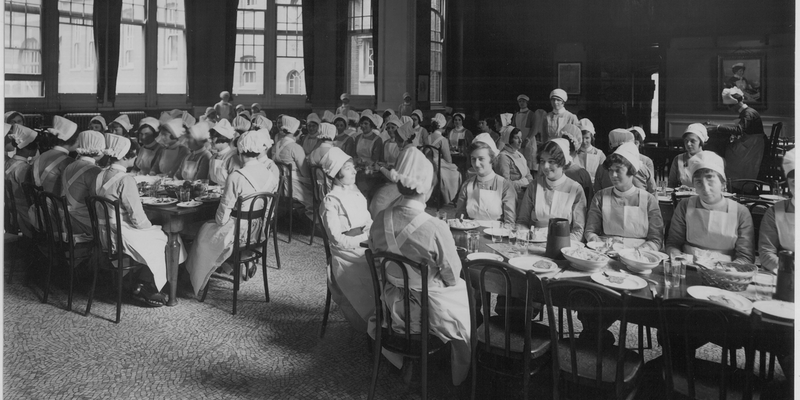London School of Hygiene & Tropical Medicine and Health Archives and Records Group
Workshop on handling sensitivity issues in scientific and medical collections
Friday 17 July 2017, 09:30 to 16:15 (BST)
Report of Proceedings
Organisers:
Geoff Browell (Head of Archive Services, King’s College London and HARG Chair)
Clare Button (Project Archivist, Centre for Research Collections, University of Edinburgh and HARG Engagement/Training Officer)
Chris Olver (Cataloguing Archivist, London School of Hygiene & Tropical Medicine, HARG Vice-Chair/Webmaster)
Attendees:
40 attendees
15 speakers
Aims
The workshop focused on handling various sensitivity issues surrounding scientific and medical records. Key themes identified at the outset were:
- different types of record sensitivities (including personal data but also legal, commercial);
- sensitivities around different record types: e.g. personal papers, institutional records, digital records, audio-visual material, datasets and databases;
- contexts for sensitivity specific to science/medicine records (e.g. potential animal rights activity, IP around tech/biotech);
- different stages of managing closure, restrictions and access (deposit, accessioning, appraising, cataloguing);
- processes for recording, managing and reviewing sensitivity decisions (e.g. undertaking risk assessment matrix);
- safeguarding medical data within big data repositories (e.g. anonymisation of data subjects)
The workshop aimed to create a forum for sharing experiences, discussing problems and moving towards formulating a clearer and more consistent set of guidelines for archivists and records professionals than currently exists.
Morning session
Welcome and introductory remarks
Victoria Cranna, Archivist and Records Manager at the London School of Hygiene & Tropical Medicine and Geoff Browell welcomed the delegates to the workshop.
A number of delegates shared a few preliminary observations and aims.
Kevin Mulley (The National Archives): professional guidance; issues around institutional sensitivity/vested interests in restricting access to records
Sue Onslow (King’s College London): Issues of sustainability outwith the life of a project; ongoing process of access/curation in collections
Alexandra Eveleigh (Wellcome Collection): Would like to see greater consistency between UK and international (eg European) decision-making within the legal frameworks. Some are more risk averse than others, and in the absence of standardised guidance this can lead to a pretty wide range of closure/access decisions with regard to similar types of content.
Karim Hussain (British Red Cross): Understanding how existing legislation comes to bear on sensitive records. Current organisational practice is to destroy any records that our potentially liable, but it is necessary to make the case that the archives service have the security and expertise to retain them. However, current legislation is hard to navigate.
Case studies
- ‘Sensitivity in an era of Open Science: Reviewing Wellcome’s policy and procedures on research access’
Alexandra Eveleigh and Jenny Shaw, Wellcome Collection
- Introduction to the Wellcome Trust’s policy ‘Access to personal data within our research collections’ (2014) aims to balance access with duty of care through a risk assessment process (e.g. when no permission from an individual exists) and consistent open/closed/restricted decision criteria
- Creation of new Collections and Research Department at the Wellcome Collection (wide-ranging scope, moving towards accreditation)
- A number of gaps identified with scope of the policy: commitment of public bodies (including Wellcome) to open access and the use of personal data for research; copyright; digitisation. Archive policies can seem out of kilter.
- Development of new, wider policy of access to sensitive records: for example, corporate confidential
- Clinical and distressing content. Issue of ‘unidentified but identifiable human subject’ (eg photographs of surgery) – potential lack of consent and context. Restrict access to some content to healthcare professionals?
- Material relating to criminal/illegal activity such as drug-taking. Restrict due to potential to incite criminal activity? Though also risk making moral judgements
- Cultural sensitivities practices and artefacts (e.g. totemic symbols) represented displayed outwith their originating society. Issue of Henry Wellcome’s own collecting practices
- Collaboration with depositors important
- Re-review of closure periods ongoing
- Scaleability and digital access are considerations
- Increase level of clarity about grounds on which access decisions are made
- Time-consuming nature of work – staff resources have to be considered
- ‘To the Crick! Moving home after 100 years: the MRC National Institute for Medical Research archive project’
Geraldine Clement-Stoneham, Emma Anthony, Eleni Loli, Lara Nelson, National Institute for Medical Research (MRC)
- NIMR archive represents an institutional history but also personal and scientific networks
- 3 types of sensitive records identified:
- Personal data
- Directors’ correspondence, personnel records, research, personal advice and information on behavior, medical records
- Personnel files maintained after business use has expired, though rich in historical and contextual information
- Data which provides evidence of research
- How to sample? Issues around simply selecting high-profile people (directors, Nobel Laureates)
- Sensitive to the organisation
- Need to balance access to records which could pose a risk to MRC’s reputation against MRC’s mission to promote dialogue with the public and encourage transparency and openness.
- Context is key – do we know enough? Potential for misinterpretation if material used out of context, e.g. films used by anti-vivisectionists.
- Example of Wilhelm Feldberg (1900-1993) who had his Home Office license revoked after anti-vivisectionists gained access to the labs and revealed unnecessary suffering to animals was being carried out. Yet Feldberg’s publications are explicit about the use of animals in his research. As the Royal Society has complementary collections, it was decided to transfer his papers there to ensure context
- Sentiment and legacy
- Staff investment and emotion, coming to terms with changes in the organisation
- Issues of information professionals with no scientific background or emotional stake being seen as ‘invaders’ by staff
- To manage this it was important to build relationships and trust. An Archives Advisory Group was formed comprising an archivist, librarian, historian, scientist, and Head Office staff.
- This Group assessed risk, evidential and informational value of records and provided advice to MRC to inform decision-making process
- ‘Protecting patients, respecting researchers – case note cataloguing at LHSA’
Louise Williams, Lothian Health Services Archive, University of Edinburgh
- How to give researchers access to closed records?
- Framework of Data Protection Act, Scottish Government guidelines
- LHSA have 1 million+ case notes comprising different formats of documents (illustrations, pro forma documents, handwritten notes, personal items)
- Underused and untreated, confidential information and complex clinical terms – written ‘by clinicians for clinicians’
- Wellcome Trust-funded project ‘Cataloguing Norman Dott’s Neurosurgical Case Notes (1920 – 1960)’ to create a redacted public online catalogue to give access to case notes which would otherwise be closed
- Confidential patient-identifiable catalogue available only to legitimate researchers
- Scoping period of project ascertained key attributes of the records and their associated EAD elements for the catalogue structure
- Catalogue created using EAD in XML editor <oXygen/>
- Catalogue entries record gender, age, location, occupation, medical condition, treatment given
- Indexing using Medical Subject Headings (MESH) to allow standardisation of clinical terminology
- Using an xslt spreadsheet allows confidential attributes (e.g. names) to be redacted on the public catalogue
- Anonymisation possible by using general terms – ‘not revealing the jigsaw’ (i.e. not giving enough details away so people can identify the person using other resources)
- Now trialling project methodology on other collections, e.g. cardiothoracic and sexual dysfunction case notes
- ‘Pathways to Research: cataloguing and indexing Tavistock and Portland NHS Foundation Trust Clinical and Corporate Archives’
Amy Proctor, London Metropolitan Archives
- Tavistock Clinic: opened 1920 to treat nervous disorders incl. shell shock. Later made therapies more widely available with doctors offering services for free. Building destroyed in WW2 so few early records survive (most cover 1930s-1960s)
- Portman Clinic: forensic psychoanalysis of adults and ‘delinquent’ children exhibiting violence and disturbed sexual behaviours. One of the first clinics to introduce play therapy. Series of closed clinician files (1933-1994)
- Changing contexts: some behaviors now decriminalized, differently understood and categorised
- High research value of records as both clinics were pioneers in their fields
- Aims of project: to extract information from the case files (originally only indexed by name of patient) onto a database, anonymise data and use standardised terms
- Poor recordkeeping of clinicians an issue
- Lack of ‘distance’ historically due to recent date of some material
- Working on further access protocols
- ‘Laboratories, lawyers and love letters: diverse sensitivities in scientific collections’
Clare Button, Centre for Research Collections, University of Edinburgh
- Projects to catalogue and conserve animal genetics and molecular biology collections (1890s-2010s) at the University of Edinburgh
- Science intersects with a number of spheres – about people as much as research (health, careers, reputation, personal lives), with sensitivities beyond Data Protection
- Range of record types: personal papers of scientists, institutional records, research data, oral histories
- Range of sensitivities
- Legal (disputes over patents and intellectual property, scientists as expert witnesses, range of documents collated for cases, but originally created for different purposes, issues of legal advice privilege
- Commercial (patent documents, heads of agreement, contracts, intellectual property, commercial confidentiality)
- Personal (employment/personnel records, recruitment and disputes, personal opinions and relationships, referee reports, nominations for awards, issue of career sensitivity)
- Overlap of professional and personal material common
- Context-based sensitivities: e.g. whether a document (e.g. grant application) is ‘career sensitive’ can depend on age/status of individual as much as personal data content
- Issues around unpublished research data/papers/concepts: research data may remain ‘current’ over a long period of time
- Subject may be deceased but content of records may remain sensitive for family members and colleagues
- Access decisions spreadsheet created, drawing on guidance from Wellcome Collection, projects (such as Walter Bodmer cataloguing project, Oxford)
- Screening carried out at file/item-level, though this is time-consuming and may not always be possible
- Redacted access-copies made of oral histories
- ArchivesSpace allows recording of access/closure decision by type and review/open dates – no prompt to automatically review records when restriction period ends, though potential to run reports on annual basis (under investigation)
- ‘Medical Collections Project’
Louise Piffero, Leeds University Library Special Collections
- Wellcome Trust-funded project to provide access to health and medical collections in Leeds through cataloguing, digitisation and conservation
- Collections include Leeds School of Medicine, burial records, personal papers as well as structured data (eg nurse training records)
- Early medical and surgical case histories (1800s) are not Data Protection-sensitive but still potentially distressing
- Decision made to put a ‘content warning’ on digital images
- Gypsy and Traveller collections also covered: these contain medical content in a non-medical context (e.g. references to physical and mental health, personal and domestic information)
- References to racial origin carries specific cultural sensitivities in these communities
- ‘ALSPAC (Avon Longitudinal Study of Parents and Children) Administrative Archive Project’
Hannah Lowery, Michael Hunkin and Karen Anderson, University of Bristol Library Special Collections
- Wellcome Trust-funded project (2015-2018) around the ALSPAC (‘Children of the Nineties’) longitudinal study which is still ongoing
- Administrative rather than medical papers (1980s-2005), approximately 1002 boxes, 950 of which are within scope of the listing project.
- Lack of records management prior to donation
- ALSPAC project have a complex ‘Data Matrix’ based on document security markings but this is difficult to apply retrospectively
- ALSPAC want blanket ‘closed’ status applied even to documents marked ‘open’ on their own Data Matrix
- Making correspondence accessible through redaction and removal of sensitive data
- Aims of original project are a consideration – participant anonymity guaranteed by ALSPAC though some participants have chosen to ‘go public’
- Decision to apply in-house open/closed access controls as well as ALSPAC data matrix.
- Negotiating open access for non-sensitive material
- Have been redacting individual files, but too time-consuming given the project timeline
- Clear guidelines in places that records with participant data will be returned to ALSPAC
- Attempting to determine appropriate closure periods for sensitive classes of records. Liaison with colleagues working on archives of other cohort projects.
- ‘Whitehall Study: Sensitive records within a longitudinal health survey’
Chris Olver, London School of Hygiene and Tropical Medicine
- Longitudinal health study of 18,000 middle-aged male civil servants in London area. The study collected data during initial screening in 1967-1970, followed by occasional follow-ups and long term monitoring through the Office of National Statistics, which still goes on to this day.
- The purpose of the study was to identify early signs of cardiovascular and respiratory conditions and refer these men to their GPs. Controlled studies were also run on at risk volunteers to reduce smoking levels, high blood sugar and weight.
- The main impact of the study was that the risk of mortality increased further down the social gradient, where lower grade employees were a third more likely to die from the disease than the highest grade employees.
- With over 60% of material being clinical medical data, conducting a sensitivity survey was a vital stage in the project methodology.
- Record types include questionnaires and death certificates, electrocardiograms
- Some records classed as medical data but specialist knowledge is needed to interpret records and to identify individuals
- Various forms of personal data: addresses, jobs, marital status, medical and family medical history, prescribed medications
- Death certificates – not covered by Data Protection as they are public records. However they record personal details, cause of death (often sensitive for family members, e.g. graphic descriptions of suicide method, hereditary diseases etc), coroner’s verdicts, personal details of informants
- Decision made to separate individual (problematic) questionnaires out from the rest of the file and store separately. Isolated material would then be reviewed by the Archive team at the end of the project, where a decision would be taken on the access status (open, closed, restricted).
- Existing guidance tends to focus on providing a framework to looking at sensitivity, dealing with particular record groups and access restrictions as a whole (Data Protection, donor restrictions and conservation, rather than sensitivity itself)
- Decisions often case by case basis, down to individual or institutional judgement and ideas of acceptable risk
- More consistency needed
- ‘“Why did you fight?” Narratives of the Rhodesian Bush War 1965-1980’
Sue Onslow, Institute of Commonwealth Studies
- Oral history project aimed at gathering a ranks-level view of the conflict, to act as a corollary to Rhodesian Army Association archives then housed in the British Museum for Empire and Commonwealth. The RAA archive is now closed.
- 25 written questionnaires and 93 semi-structured oral history interviews produced
- 118 oral history transcripts of former white members of the Rhodesian security forces (2008-2010)
- Interview process conducted by two interviewers: request for interview; consent and deposit forms; data capture and storage; clearance process; redaction/closure/withdrawal; amendment of audio recording; archiving
- Interviewers not trained counsellors, but treated as such by a considerable number of interviewees
- Legal advice sought on Data Protection issues, and intellectual property rights before the project began. Each interview and questionnaire transcript has a Consent and Deposit form, governing access and citation.
- Sensitivities around counter-insurgency programme, pariah state, operation details, transgression of legal and cultural practices, war crimes and human rights abuses, references to chemical and biological warfare
- Recurrence of ‘jigsaw’ concept – i.e. it is possible to piece together who people are using different sources now available via the internet. Consequently the oral history collection is currently closed for reassessment of interviews, to ensure strict compliance with DPA
- Ownership/authorisation of recordings (e.g. consent of/contact details for family members)
- Ongoing management, permissions and intellectual oversight needed, to prevent transcripts ‘leaking’ onto the internet.
- Provenance of collections makes sensitivity-checking more challenging
- Overseas origins presents particular sensitivity concerns along with contemporary records of still-living people in situations of regime change
- Highlights how sensitivity reviews need to take place within changing (e.g. political) contexts
- Health sector has lessons to learn from war studies, international relations and modern history processes relating to sensitive information
Panel session
Geoff Browell highlighted some key themes and questions:
- How do we manage metadata through sensitivity in relation/relating to sensitivity decisions? i.e. we standardise sensitivity-related fields, grammar and key words across systems, institutions and archive practice.
- How much risk do we want to bear?
- Value judgements about cultural contexts
- Commercial and legal dimensions of research (e.g. pharmaceutical and biotechnology contexts of scientific and medical collections)
- How do we record sensitivity decisions over time?
- Cost and sustainability are recurring themes: the recurring cost across time as sensitivity review is rarely a one-off but a periodical or occasional requirement, depending on changing cultural and institutional contexts (changes in sensibility or collections being transferred to other bodies) or new/unforeseen uses.
- Context – e.g. campaigning videos, shifts in politics and attitudes, ‘graphic’ nature of records
Other points raised during the discussion:
- People may give consent to take part in a medical study but not for their details to be used in historical research
- Who do/should archivists work with? E.g. advisory committees, specialist and community groups, current investigators, charities (e.g. MIND) and originating bodies (who may have their own policies)
- Working with scientists and academics to help interpret data, records, identify different sensitivities and make contacts. Though also a dual issue of working with other groups as there may be organization and personal stakes and biases
- Clinicians can help to interpret health records to users accessing them
- Consent and use. If researchers want to access oral histories they have to contact the interviewee. Importance of maintaining up-to-date contact details
- Issue with idea of information professionals ‘educating’ other groups – these groups can in fact challenge and improve our own professional practice
- What is a ‘legitimate researcher’?
- Subjectivity around record types themselves – e.g. sexual health records can be seen as ‘pariahs’ more so than tuberculosis or neurosurgical records
- How do we define/who defines what is or isn’t ‘graphic’?
- ‘Closeness’ to a record in both personal and historical senses
- Context needed to understand records and images
- Managing a research archive while research data is held separately/elsewhere
Afternoon session
During the afternoon session, delegates were asked to consider five questions within groups. Each group was given 10 minutes to record their responses to each question. After all the answers were submitted, a summary of the responses received for each question was presented by the workshop organisers. These can be seen below.
The delegates considered the following questions:
- What processes do you use to record and review closures/restrictions (e.g. databases/spreadsheets, catalogue systems, in-house procedures)?
2. At what stages would you manage restrictions/access and how do they differ from each other (e.g. deposit/accession, cataloguing)?
3. What processes for managing hybrid or digital collections?
4. What are some of the biggest challenges you’ve faced around sensitivity and how have you tackled them?
5. What are some of the best forms of guidance/help/resources you have used to handle sensitive records?
Closing remarks/next steps
- More training needed: not only existing legislation (and upcoming General Data Protection Regulation) but also broader sensitivity themes (i.e. sensitivity issues with donors, cultural sensitivity)
- More consistency needed across metadata/standards
- Need for a single repository for guidance on sensitivity
- Wider communication and collaboration across the information management sector e.g. records managers and data managers
It was agreed that a follow-up event was necessary to investigate further some of the themes brought up in the workshop and would include input from the legal profession, big data, wearable technology, born-digital material and historians. The ICO will be invited to participate and further discussions with the Wellcome Trust to coordinate a joined-up set of guidance. It was also suggested that a set of user cases would be useful to act as benchmarks and practical guidance to inform and reassure internal audiences in an organisation about best practice.
